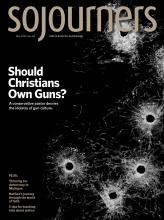IN 1968, the [Latin American Catholic] bishops met in Medellín, Colombia, to examine the church’s role in social and political transformation in Latin America. Here the vision of a “preferential option for the poor,” which had been rising up from the base for several years, was first clarified.
“The Lord’s distinct commandment to evangelize the poor,” wrote the bishops at Medellín, “ought to bring us to a distribution of resources and apostolic personnel that effectively gives preference to the poorest and most needy sectors.”
Read the Full Article

Already a subscriber? Login
